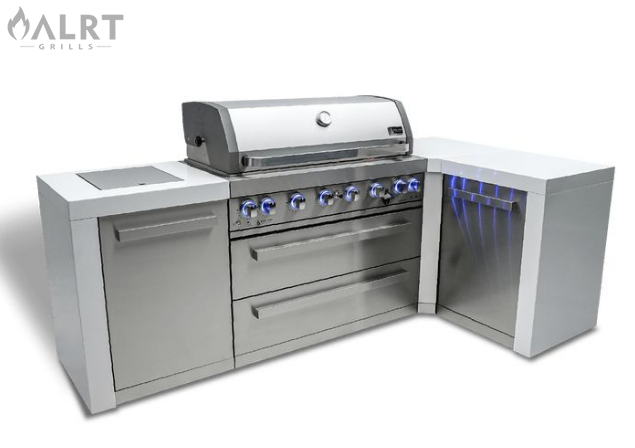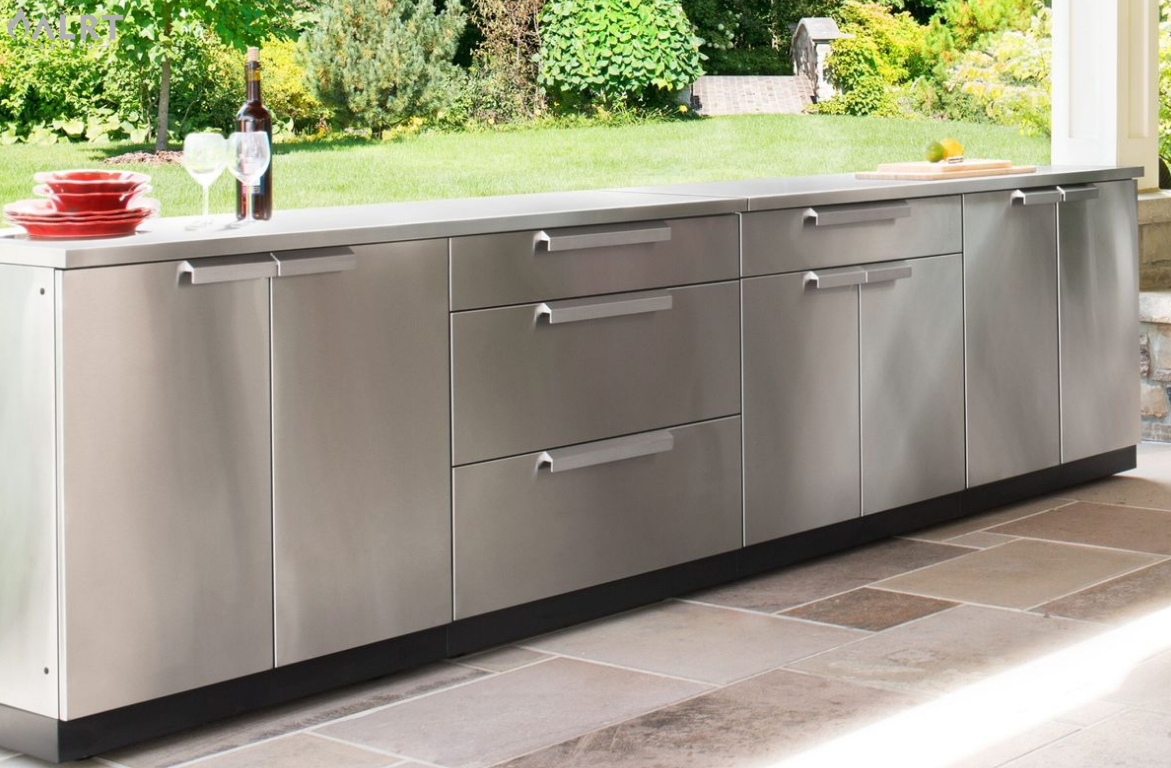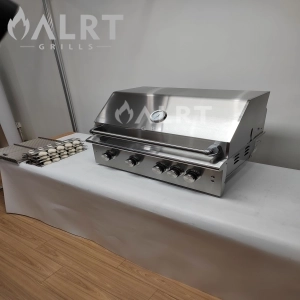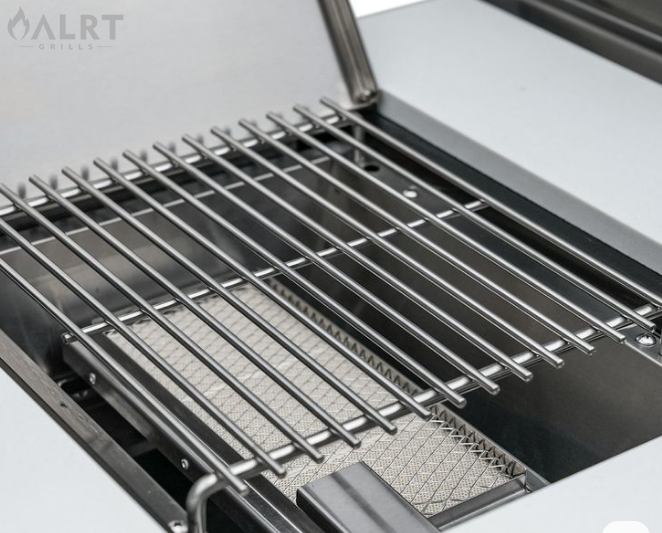Why Stainless Steel? Material Science Behind Longevity
Stainless steel gas grills have become synonymous with premium outdoor cooking, but their reputation for longevity often raises questions: Do they truly outlast alternatives? As a BBQ islands manufacturer specializing in outdoor kitchen grills, we’ll dissect the science, engineering, and real-world performance of stainless steel grills. Whether you’re sourcing gas grills wholesale or designing a custom outdoor kitchen island, this guide reveals why stainless steel remains the gold standard for durability.
1. Corrosion Resistance
Stainless steel’s chromium content (minimum 10.5%) forms an invisible oxide layer that resists rust and corrosion. This makes it ideal for coastal climates or high-humidity environments where carbon steel grills degrade rapidly. For example, Blaze Professional Grills use 304-grade stainless steel, which retains structural integrity even after years of saltwater exposure.
2. Thermal Stability
High-end outdoor BBQ grills leverage stainless steel’s ability to withstand extreme temperatures (up to 1,600°F) without warping. Unlike cast iron, which cracks under rapid heat changes, stainless steel burners and grates maintain consistent performance.
3. Low Maintenance
Stainless steel requires minimal upkeep—no seasoning or protective coatings. A simple wipe with mild detergent prevents grease buildup, making it a favorite for wholesale BBQ islands in commercial settings like resorts.
Engineering Enhancements: Beyond Basic Material
1. Grade Matters: 304 vs. 430 Stainless Steel
304 (18/8 Stainless): Contains 18% chromium and 8% nickel, offering superior corrosion resistance. Used in premium models like the Blaze 40” Built-In Grill.
430 Stainless: Lower nickel content reduces cost but sacrifices longevity. Common in budget grills, it may rust in harsh conditions.
2. Reinforced Construction
Luxury outdoor kitchen grills integrate features like:
Double-walled hoods to retain heat and prevent warping.
Laser-welded seams to eliminate weak points where moisture could penetrate.
Infrared burners with stainless steel emitter plates for decade-long durability.
3. Modular Design
Modular BBQ islands allow components (burners, shelves) to be replaced individually, extending the grill’s lifespan. This flexibility appeals to gas grill wholesale buyers seeking cost-effective upgrades.
Case Studies: Stainless Steel in Action
1. Coastal Resort Durability
A Florida resort replaced carbon steel grills with 316L stainless steel units from a BBQ islands manufacturer. After five years, zero rust was reported, despite daily saltwater exposure.
2. High-Traffic Commercial Kitchens
A restaurant chain using 304 stainless gas grills saw a 40% reduction in maintenance costs over seven years compared to ceramic-coated alternatives.
Maximizing Lifespan: Maintenance Best Practices
1. Routine Cleaning
Wipe surfaces with a stainless steel cleaner to prevent oxidation streaks. Remove grease from drip trays weekly to avoid fire hazards.
2. Seasonal Inspections
Check burner ports for blockages. Inspect gas lines for leaks using soapy water.
3. Professional Servicing
For outdoor kitchen islands with built-in grills, annual professional servicing ensures valves and igniters function optimally.
Commercial Value for B2B Buyers
1. Cost Efficiency in Bulk
As a gas grill factory, we offer tiered pricing for gas grills wholesale orders. Stainless steel’s longevity reduces replacement frequency, lowering total cost of ownership for hotels and developers.
2. Custom OEM Solutions
Design grills with brand-specific logos or extra-thick grates for luxury outdoor kitchen island projects. Customization enhances client retention for BBQ islands manufacturers.
3. Warranty Advantages
Premium stainless models like Blaze Grills come with lifetime warranties on burners and bodies, a strong selling point for commercial buyers.
FAQ
Q1: How long does a stainless steel gas grill typically last?
A: With proper care, high-grade (304/316L) stainless grills last 10–15+ years, outperforming carbon steel by 2–3x.
Q2: Can stainless steel grills rust?
A: Lower-grade alloys (e.g., 430) may develop surface rust, but 304/316L resists corrosion unless scratched deeply.
Q3: Are stainless steel grills worth the higher upfront cost?
A: Yes. Reduced maintenance and replacement costs make them 20–30% cheaper over a decade compared to budget options.
Q4: Do stainless steel grills require special cleaners?
A: Mild dish soap works, but dedicated stainless steel cleaners prevent streaking on premium outdoor kitchen grills.
Q5: Can I upgrade my existing grill with stainless components?
A: Many BBQ islands manufacturers offer retrofit kits for burners and grates, extending your grill’s life affordably.

Conclusion
Stainless steel gas grills dominate the premium market for a reason: their unmatched durability pays dividends for homeowners and gas grill wholesale buyers alike. By combining advanced alloys with smart engineering, manufacturers create grills that withstand decades of use—perfect for luxury outdoor kitchen islands or high-volume commercial setups. As corrosion-resistant materials and modular designs evolve, stainless steel remains the backbone of reliable outdoor cooking.

 English
English Italian
Italian Russian
Russian German
German Arabic
Arabic Spanish
Spanish





